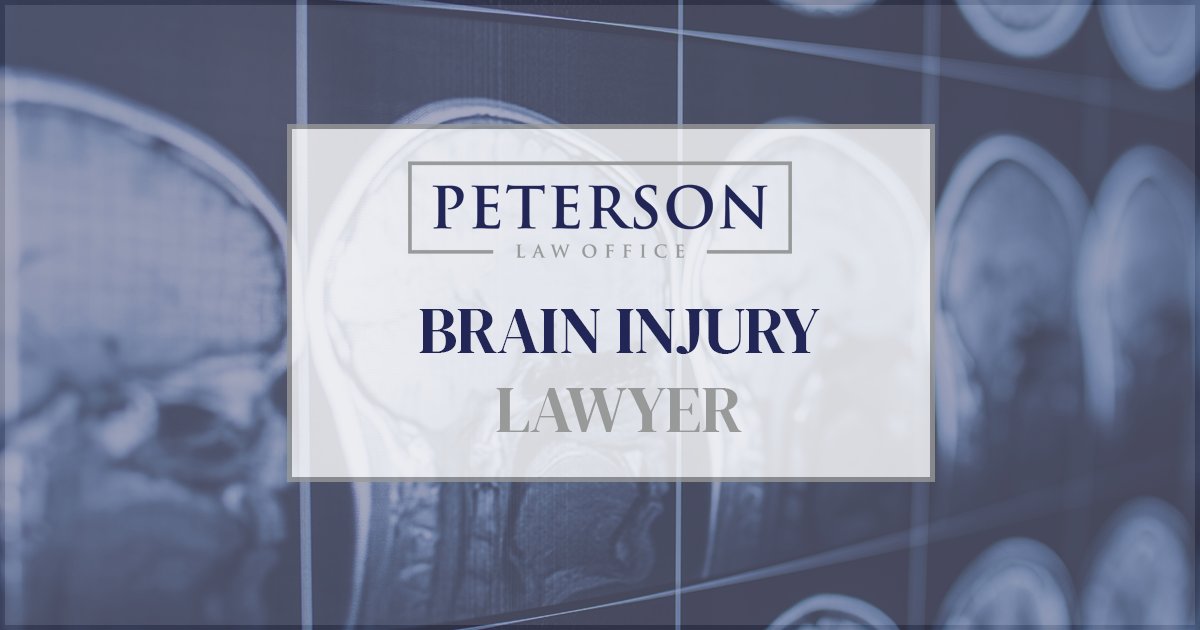
Life moves at a rapid pace in the city of Lexington, Kentucky. Unfortunately, accidents can occur just as quickly. In the blink of an eye, folks can be left grappling with the aftermath of a brain injury.
These injuries, ranging from mild concussions to severe traumatic brain injuries (TBIs), can have profound and lasting effects on victims and their families.
When facing such challenging circumstances, seeking the guidance and expertise of one of our dedicated Lexington brain injury lawyers at Peterson Law Office can make all the difference in navigating the complex legal landscape and securing the compensation and support deserved.
Understanding Brain Injuries
Brain injury cases are more common than many people realize. According to Centers for Disease Control and Prevention (CDC) statistics, brain injuries affect approximately 1.5 million people in the United States every year.
- Every day, roughly 176 people in the U.S. die from head trauma.
- Over 223,000 people were hospitalized for TBI injuries in 2019.
- In 2020 alone, 64,362 individuals died from TBI-related injuries.
These statistics only reflect accidents reported or treated in a hospital setting. It’s estimated that thousands more injuries and fatalities are not recognized in TBI statistics published by organizations like the CDC.
Before delving into the legal aspects, it’s crucial to comprehend the various types of brain injuries and their impacts.
Concussions, often considered mild traumatic brain injuries, can result from falls, car accidents, or sports-related incidents. While some individuals recover fully from concussions, others may experience lingering symptoms, such as headaches, dizziness, and cognitive difficulties.
Traumatic brain injuries (TBIs) can have a wider range of long-term effects that vary depending on the severity of the injury, the area of the brain affected, and individual factors.
Some common long-term effects of TBIs include:
- Cognitive Impairments: TBIs can result in difficulties with memory, attention, concentration, and problem-solving. Individuals may experience challenges with learning new information, processing thoughts, and organizing tasks.
- Communication Disorders: Damage to areas of the brain responsible for language and communication can lead to speech and language impairments, including difficulty speaking, understanding language, or expressing thoughts coherently.
- Emotional and Behavioral Changes: TBIs can cause significant alterations in mood, behavior, and personality. Individuals may experience mood swings, irritability, impulsivity, depression, anxiety, or agitation. They may also exhibit inappropriate social behaviors or lack of empathy.
- Physical Disabilities: Depending on the severity and location of the injury, individuals may experience physical disabilities such as paralysis, weakness, coordination problems, or difficulties with balance and coordination. These disabilities can impact mobility and independence.
- Sensory Impairments: TBIs can affect sensory functions, leading to changes in vision, hearing, taste, or smell. Individuals may experience blurred vision, double vision, sensitivity to light or noise, or loss of sensation in certain areas of the body.
- Seizures and Epilepsy: Some individuals who sustain TBIs may develop seizures or epilepsy as a long-term complication. Seizures can range from mild to severe and may require ongoing medical management.
- Sleep Disturbances: TBIs can disrupt normal sleep patterns, leading to insomnia, excessive daytime drowsiness, or other sleep-related disorders. Sleep disturbances can exacerbate cognitive and emotional difficulties and impact overall functioning.
- Chronic Pain: Headaches and other types of chronic pain are common long-term effects of TBIs. These pains may result from nerve damage, muscle tension, or other underlying factors and can significantly impact quality of life.
- Increased Risk of Neurodegenerative Diseases: Research suggests that individuals who have sustained a TBI may have an increased risk of developing neurodegenerative diseases later in life, such as Alzheimer’s disease, Parkinson’s disease, or chronic traumatic encephalopathy (CTE).
- Impact on Relationships and Social Functioning: The long-term effects of TBIs can strain relationships with family members, friends, and coworkers. Changes in behavior, mood, and communication abilities may lead to social isolation, misunderstandings, and challenges in maintaining meaningful connections.
According to recent data, around 2.8 million people suffer a traumatic brain injury every year, leading to 282,000 hospitalizations and 50,000 deaths.
TBI victims may require extensive medical care, rehabilitation, and ongoing support to cope with the challenges posed by these injuries, impacting not only their lives but also their families’ livelihoods.
It’s also important to note that the long-term effects of TBIs can vary widely from person to person, and some individuals may experience more significant impairments than others. Early and ongoing intervention, including medical treatment, rehabilitation, and support services, can help mitigate the impact of TBIs and improve the overall quality of life for affected individuals.
The Role of a Lexington Brain Injury Lawyer
In the aftermath of a brain injury, victims and their families often find themselves grappling with medical bills, lost wages, and emotional distress. Navigating the legal complexities while dealing with these challenges can be overwhelming.
This is where a seasoned Lexington attorney steps in to provide guidance, support, and advocacy.
A reputable personal injury lawyer specializing in brain injury cases brings a wealth of knowledge and experience to the table, understanding the nuances of personal injury law and the unique considerations involved in brain injury cases.
From conducting thorough investigations to gathering evidence and negotiating with insurance companies, their expertise can be instrumental in securing fair compensation for their clients.
The Legal Process
The legal process surrounding brain injury cases can be intricate, requiring careful attention to detail and strategic planning.
A skilled brain injury lawyer begins by conducting a comprehensive assessment of the case, examining medical records, consulting with experts, and identifying liable parties. Once the groundwork is laid, the lawyer initiates the legal proceedings by filing a lawsuit or negotiating a settlement with the at-fault party’s insurance company.
Throughout this process, they advocate tirelessly on behalf of their clients, striving to achieve the best possible outcome while alleviating the burden on the victims and their families.
Navigating Insurance Claims to Maximizing Compensation
Insurance companies play a significant role in the resolution of brain injury cases, often seeking to minimize payouts and protect their bottom line. Dealing with insurance adjusters can be daunting, especially for individuals already grappling with the physical and emotional toll of a brain injury.
A skilled Lexington brain injury lawyer serves as a staunch advocate for their clients in dealings with insurance companies, ensuring their rights are protected and they receive the full and fair compensation they deserve.
From negotiating settlements to litigating in court, they employ various strategies to maximize compensation for medical expenses, lost wages, pain and suffering, and other damages.
Supporting Clients Every Step of the Way
Beyond the legal realm, a compassionate Lexington brain injury lawyer offers invaluable support and guidance to their clients throughout the recovery process. They understand the multifaceted challenges faced by brain injury victims and their families and strive to provide personalized attention and assistance every step of the way.
Whether coordinating medical care, connecting clients with support services, or offering a compassionate ear to listen to their concerns, a dedicated lawyer goes above and beyond to ensure their client’s needs are met.
By serving as a trusted ally and advocate, they empower brain injury victims to focus on their recovery while pursuing justice and compensation for their losses.
In the wake of a brain injury, navigating the legal complexities can be daunting, adding to the already considerable challenges you and your family are facing. However, with the guidance and support of a skilled brain injury lawyer at Peterson Law Office, you can find solace knowing that you have a dedicated advocate fighting on your behalf.
From understanding the nuances of brain injury cases to navigating insurance claims and providing unwavering support, our attorneys play a pivotal role in helping you reclaim your life and secure the compensation and support you need to move forward.
If you or a loved one has suffered a brain injury due to the actions of the negligence of others, reach out to us today for a free consultation to discuss your rights.
In times of uncertainty and adversity, having our compassionate and experienced legal team by your side can make all the difference in your journey toward recovery and justice.
Contact us today for a free consultation, and let’s get started protecting your rights!






